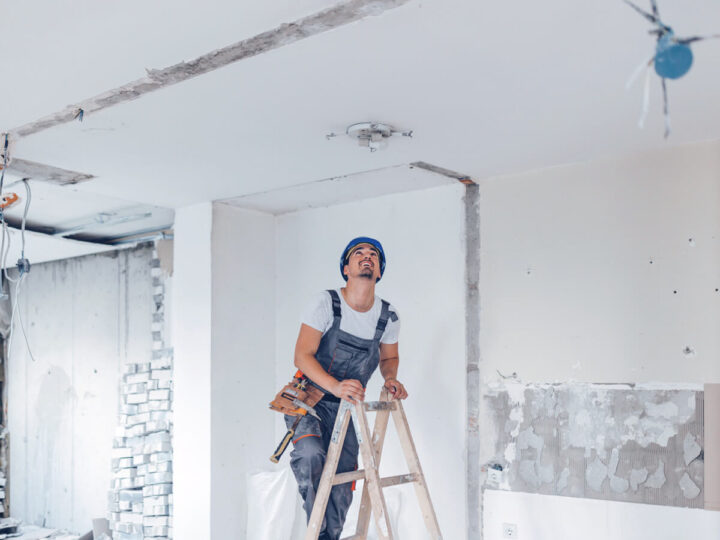October 6th, 2022
5 questions first-time Property Investors should ask
First time investors
Guides

As more companies and individuals have jumped into the Australian property market and resulting house prices have boomed over the last decade, investors have increasingly turned towards an alternative strategy to deliver higher returns: ‘fixer-uppers’.
Often under-priced and with the potential to generate large profits, fixer-uppers can be flipped to offer incredible upsides to investors. But this also poses substantial risks.
So, before you go driving around overlooked neighbourhoods searching for hidden gems, it’s important to know exactly what you are getting into and whether it will be worth it in the long run. In this guide, we look at five questions every investor needs to ask themself before buying a fixer-upper.
The most pressing and important question to ask about any property you’re considering is “are there any issues?” Obviously, with a fixer-upper, there will be—that’s the whole point of the endeavour, after all—but what you really want to be looking out for are any major structural issues or potential engineering problems with the land itself.
Exactly what these look like will vary between properties, so it pays to have a builder or building inspector accompany you when you take your first look. ome tell-tale signs of structural issues to look out for are cracks in the foundation or any masonry walls, evidence of water damage (such as peeling or bubbling paint), sagging rooflines or floors, and any evidence of termites such as brittle or rotten wood or mud runners around the property.
Engineering problems (or the potential for them) are harder to spot without a proper technical report but there are still some basic things you can check during your initial inspection of the property. Take note of the slope of the site as well as the composition of the soil: is there a lot of clay present that could affect the building’s foundations both now and in the future? If the site is on a steep slope, then it could make access difficult and add to the cost of the repairs.
‘Location, location location’ is an old adage in real estate and one that holds true regardless of whether you’re dealing with new builds or renovations. Sometimes a fixer-upper is priced low not because of any major issues but because of where it’s located.
Although it can be tempting to make an offer on a property that has good bones and requires relatively little work to reach a sellable condition, you’ll struggle to be able to sell it if it’s in a location that nobody wants to live in, no matter how good it looks.
Part of the challenge involved in flipping fixer-uppers is identifying neighbourhoods that are up-and-coming but still undervalued. While there is no exact science to this, a discerning investor will look at a property’s proximity to major infrastructure and amenities such as schools and public transport links as part of their decision-making process, while also getting a feeling for the neighbourhood in general.

By ‘this’ we’re talking about the actual process of repairing or renovating the property in question. Ultimately, a fixer-upper is an investment just like any other and the amount of time it requires to renovate will inevitably impact your returns on that investment.
While there are some properties out there that could deliver a great return if given enough time, such labours of love are best avoided by the investor and left to those that possess the time, patience and passion to see these Grand Designs style projects through to the end.
Although it is possible to ‘flip’ a home in as little as six months, this is usually only the case when minor cosmetic changes are required. A true fixer-upper will usually require significantly more work on it, and thus, significantly more time. Depending on your experience and the resources at your disposal (and assuming everything goes smoothly) you can expect to spend 12-18 months renovating a fixer-upper—anything longer risks becoming unprofitable.
Before committing to a property, you need to make an honest assessment of the project’s expected timeline and decide whether it is worth it as an investor.
Nothing slows a project down like getting stuck in red tape, so knowing what you can and cannot do to a property is essential in determining whether it is a project worth pursuing. Council planning controls will vary depending on local zoning and heritage laws and can impact everything from the types of materials and methods that can be used during a renovation, to the colour that you can paint the exterior walls.
Having a clear understanding of what is permitted under the local regulations will allow you to form a clearer idea of what the renovation process will look like and, ultimately, whether the property is right for what you have planned.

At the end of the day, all of the other questions are simply a means of answering this most crucial one: is it going to be worth it? Experienced investors will have systems in place to help them reach a conclusion quickly but if that’s not you then you’ll just have to sit down and work it out.
Multiple aspects determine whether a fixer-upper is worth it. The 70% rule is a general guide used by many investors to help them assess the financials of a purchase. It advises that you should never pay more than 70% of a property’s after-repair value (ARV) minus the cost of repairs.
Just remember that investing in a fixer-upper is about more than just money. The amount of time it will take, the amount of stress involved, and the potential risk you will be taking on all need to factor into whether or not a property will be ‘worth it’ as a fixer-upper. Successfully investing in a fixer-upper requires you to be brutally honest with yourself, so don’t be afraid to ask hard questions about the costs—financial or otherwise—that will be involved in the process to figure out whether or not it is worth it for you.
Whether you’ve bought a fixer-upper to rent and sell shortly or rent over the longer run, effective and efficient property management will make your life far easier as an investor.
With PropertyMe’s mobile app, easy and effective property management rests in the palm of your hand. Access your information and documents, track your expenses, monitor maintenance requests and so much more. Easy to use and with ongoing updates and support, the PropertyMe mobile app is essential for any investor who is serious about maximising the potential of their property portfolio.
Ask your Property Manager or local agency whether they use the app.